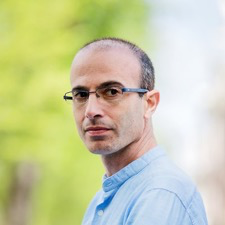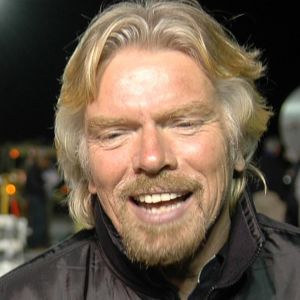Want to know what books Chan Koonchung recommends on their reading list? We've researched interviews, social media posts, podcasts, and articles to build a comprehensive list of Chan Koonchung's favorite book recommendations of all time.
1

Now reissued in a gorgeous hardcover edition: "one of the most prophetic dystopian works of the 20th century" (Wall Street Journal) must be read and understood by anyone concerned with preserving the human spirit in the face of our "brave new world." Huxley's masterpiece has become a bestseller once again after the American election.
Aldous Huxley's profoundly important classic of world literature, Brave New World is a searching vision of an unequal, technologically-advanced future where humans are genetically bred, socially indoctrinated, and pharmaceutically... more Now reissued in a gorgeous hardcover edition: "one of the most prophetic dystopian works of the 20th century" (Wall Street Journal) must be read and understood by anyone concerned with preserving the human spirit in the face of our "brave new world." Huxley's masterpiece has become a bestseller once again after the American election.
Aldous Huxley's profoundly important classic of world literature, Brave New World is a searching vision of an unequal, technologically-advanced future where humans are genetically bred, socially indoctrinated, and pharmaceutically anesthetized to passively uphold an authoritarian ruling order whose motto is "Community, Identity, Stability."—all at the cost of our freedom, humanity, and perhaps our souls. "A genius [who] who spent his life decrying the onward march of the Machine" (The New Yorker), Huxley was a man of incomparable talents: equally an artist, a spiritual seeker, and one of history's keenest observers of human nature and civilization. Brave New World, his masterpiece, has enthralled and terrified millions of readers, and retains its urgent relevance to this day as both a warning as we head into tomorrow and as a thought-provoking, satisfying work of literature. Written in the shadow of the rise of fascism during the 1930s, Brave New World likewise speaks to a twenty-first-century world dominated by mass-entertainment, technology, medicine and pharmaceuticals, the arts of persuasion, and the hidden influence of elites. less 
Yuval Noah HarariThe most prophetic book of the 20th century. Today many people would easily mistake it for a utopia. (Source)

Sol OrwellQuestion: What books had the biggest impact on you? Perhaps changed the way you see things or dramatically changed your career path.
Orwell's Animal Farm and 1984 (though Huxley's Brave New World is a better reflection of today's society). (Source)

Andra ZahariaThese books and their core ideas have stuck with me the most and continue to guide me when I hit crossroads along the way. (Source)
2

A PBS Great American Read Top 100 Pick
With extraordinary relevance and renewed popularity, George Orwell’s 1984 takes on new life in this hardcover edition.
“Orwell saw, to his credit, that the act of falsifying reality is only secondarily a way of changing perceptions. It is, above all, a way of asserting power.”—The New Yorker
In 1984, London is a grim city in the totalitarian state of Oceania where Big Brother is always watching you and the Thought Police can practically read your mind. Winston Smith is a man in grave... more A PBS Great American Read Top 100 Pick
With extraordinary relevance and renewed popularity, George Orwell’s 1984 takes on new life in this hardcover edition.
“Orwell saw, to his credit, that the act of falsifying reality is only secondarily a way of changing perceptions. It is, above all, a way of asserting power.”—The New Yorker
In 1984, London is a grim city in the totalitarian state of Oceania where Big Brother is always watching you and the Thought Police can practically read your mind. Winston Smith is a man in grave danger for the simple reason that his memory still functions. Drawn into a forbidden love affair, Winston finds the courage to join a secret revolutionary organization called The Brotherhood, dedicated to the destruction of the Party. Together with his beloved Julia, he hazards his life in a deadly match against the powers that be.
Lionel Trilling said of Orwell’s masterpiece “1984 is a profound, terrifying, and wholly fascinating book. It is a fantasy of the political future, and like any such fantasy, serves its author as a magnifying device for an examination of the present.” Though the year 1984 now exists in the past, Orwell’s novel remains an urgent call for the individual willing to speak truth to power. less 
Steve Jobscalled this book "one of his favorite" and recommended it to the hires. The book also inspired one the greatest TV ad (made by Jobs) (Source)

Richard BransonToday is World Book Day, a wonderful opportunity to address this #ChallengeRichard sent in by Mike Gonzalez of New Jersey: Make a list of your top 65 books to read in a lifetime. (Source)

P J O’RourkeIt’s eerily predictive of the sort of video camera surveillance world that we now live in. It would be interesting to update 1984 and make all of the things that Orwell foresaw more annoying than dangerous. (Source)
3

Edward Bellamy's 'Looking Backward: 2000-1887' remains the most successful and influential Utopian novel written by an American writer. At the end of the 19th century, Bellamy creates a picture of a wonderful future society. Bellamy's protagonist is Julian West, a young aristocratic Bostonian who falls into a deep sleep while under a hypnotic trance in 1887 and ends up waking up in the year 2000 (hence the novel's sub-title). Finding himself a century in the future in the home of Doctor Leete, West is introduced to an amazing society, which is consistently contrasted with the time from which... more Edward Bellamy's 'Looking Backward: 2000-1887' remains the most successful and influential Utopian novel written by an American writer. At the end of the 19th century, Bellamy creates a picture of a wonderful future society. Bellamy's protagonist is Julian West, a young aristocratic Bostonian who falls into a deep sleep while under a hypnotic trance in 1887 and ends up waking up in the year 2000 (hence the novel's sub-title). Finding himself a century in the future in the home of Doctor Leete, West is introduced to an amazing society, which is consistently contrasted with the time from which he has come. As much as this is a prediction of a future utopia, it is also a scathing attack on the ills of American life heading into the previous turn of the century. Bellamy's sympathies are clearly with the progressives of that period. "Looking Backward" does not have a narrative structure per se. Instead West is shown the wonders of Boston in the year 2000, with his hosts explaining the rationale behind the grand civic improvements. For example, he discovers that every body is happy and no one is either rich or poor, all because equality has been achieved. Industry has been nationalized, which has increased efficiency because it has eliminated wasteful competition. This is a world with no need of money, but every citizen has a sort of credit card that allows them to make individual purchases, although everyone has the same monthly allowance. In Bellamy's world is so ideal that it does not have any police, a military, any lawyers, or, best of all, any salesmen. Education is so valued that it continues until students reach the age of 21, at which point all citizens enter the work force, where they will stay until the age of 45. Men and women are compensated equally, but there are some distinctions between job on the basis of gender, and pregnancy and motherhood are taken into account. Bellamy was living during the start of the Industrial Revolution, and like Francis Bacon and Tomasso Campanella who wrote during the height of the Age of Reason, he sees science and human ingenuity as being what will solve all of humanity's problems. He does not get into too many details regarding the comforts of modern living in the future, but there are several telling predictions (e.g., something very much like radio). However, it is clear that Bellamy is writing primarily to talk about economics and sociology, especially because he always compares his idealized future with the problems of his own time. less 
Chan KoonchungThis book came out early, in the 19th century. It’s set in America, where a future socialist state will solve or eradicate all the ills of society of late 19th century American capitalism. (Source)
4
A dystopian novel about the terrible oppressions of an American oligarchy at the beginning of the Twentieth Century, and the struggles of a socialist revolutionary movement. more A dystopian novel about the terrible oppressions of an American oligarchy at the beginning of the Twentieth Century, and the struggles of a socialist revolutionary movement. less 
Chan KoonchungMany dystopian novels are cautionary tales. I’m sure the authors have that in mind when they write – it’s a warning to their contemporaries. (Source)
5

Katharine Burdekin, Daphne Patai | 3.66
Published in 1937, twelve years before Orwell's 1984, Swastika Night projects a totally male-controlled fascist world that has eliminated women as we know them. Women are breeders, kept as cattle, while men in this post-Hitlerian world are embittered automatons, fearful of all feelings, having abolished all history, education, creativity, books, and art. The plot centers on a “misfit” who asks, “How could this have happened?” more Published in 1937, twelve years before Orwell's 1984, Swastika Night projects a totally male-controlled fascist world that has eliminated women as we know them. Women are breeders, kept as cattle, while men in this post-Hitlerian world are embittered automatons, fearful of all feelings, having abolished all history, education, creativity, books, and art. The plot centers on a “misfit” who asks, “How could this have happened?” less 
Chan KoonchungThe book was written in the mid 1930s, before the Second World War. The author is warning that the Nazi state will win a major war and then rule for seven centuries. (Source)
Don't have time to read Chan Koonchung's favorite books? Read Shortform summaries.
Shortform summaries help you learn 10x faster by:
- Being comprehensive: you learn the most important points in the book
- Cutting out the fluff: you focus your time on what's important to know
- Interactive exercises: apply the book's ideas to your own life with our educators' guidance.




